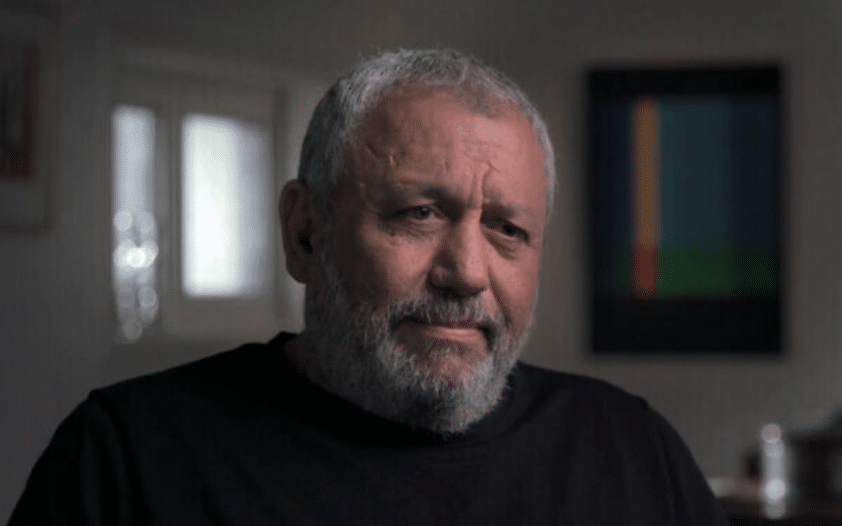War cabinet minister Gadi Eisenkot appeared to criticize Prime Minister Benjamin Netanyahu’s management of the ongoing war with Hamas in Gaza, suggesting in an interview Thursday that talk of complete victory over the terror group was unrealistic and indicating that new elections should be held within months to restore public trust in government following the devastating October 7 attacks.
Eisenkot, a former IDF chief of staff, sat down for a wide-ranging interview with Channel 12’s “Uvda” program, which also touched on about the personal toll the war has taken on him and his family. Eisenkot’s son, Master Sgt. (res.) Gal Meir Eisenkot, 25, was killed while fighting in Gaza in early December, followed by his nephew, Sgt. Maor Cohen Eisenkot, 19, a day later.
The interview with Eisenkot aired hours after Netanyahu rejected the idea of holding elections in the middle of a war that he has said could well continue into 2025 and vowed to “bring about a complete victory” over Hamas in response to the Gaza-ruling terror group’s October 7 attacks, when thousands of terrorists went on a killing spree across southern Israel, massacring 1,200 people, mostly civilians, and taking some 240 as hostages.
[The Times of Israel Report continues]
Eisenkot’s National Unity party agreed to join Netanyahu’s coalition on an emergency basis in a demonstration of political unity after the October 7 terror onslaught.
Asked whether Israel’s current leadership is telling the public the truth, Eisenkot responded simply, “No.”
Failure and responsibility
He also appeared to take a jab at Netanyahu’s refusal so far to take direct responsibility for the October 7 intelligence, military and leadership failures.
“I am already at the stage and at an age where I do not any particular leader with my eyes closed, and I judge a man by his decisions and the way he leads the country,” he said. He noted that he does not rely personally on Netanyahu in the stewarding of the war but, rather, on the collective decisions made by the war cabinet.
[The Times of Israel Report continues]
He also appeared to criticize Netanyahu’s refusal to hold high-level discussions regarding postwar planning in Gaza.
“You have to show leadership in the ability to tell the truth to people, the ability to chart a path,” he told “Uvda.” “You have to think about what’s next,” he said.
And he expressed concern about the government’s handling of the war and deep dismay about what he called “an ambush” of IDF Chief of Staff Lt. Gen. Herzi Halevi at a recent cabinet meeting. “I was pretty shocked by that show — it looked like an ambush, not spontaneous… It was very disrespectful, to put it mildly.”
Elections soon, to restore trust
Eisenkot also said elections should be held in the coming months to renew the public’s trust in leadership.
“It is necessary, within a period of months, to bring the Israeli voter back to the polls and hold elections in order to renew trust, because right now there is no trust,” said Eisenkot.
“As a democracy, the State of Israel needs to ask itself after such a serious event, ‘How do we continue from here with a leadership that has failed us miserably?’” Eisenkot continued.
[The Times of Israel Report continues]
This week, Halevi said that “the likelihood of it happening in the coming months is much higher than it was in the past.”
Eisenkot recalled prioritizing the Hezbollah threat over Hamas in 2018-19, toward the end of his 2015-2019 term as chief of staff, when the IDF tackled what he recalled were six Hezbollah tunnels that penetrated into Israel in what was called Operation Northern Shield. He said Hezbollah had 6,000 Radwan fighters training for a major attack in the north at the time.
At present, he said, Hezbollah terror chief Sheikh Hassan Nasrallah “does not want” a war, and neither does Israel. Nonetheless, he did not rule out the potential for escalation to war.
‘The alternative is hell’
Asked about the death last month of his youngest son Gal, Eisenkot said, “The mornings and nights have become more difficult, but for me at least, there is no alternative because I know that the alternative is bad personally, bad as a family, and therefore, it’s something I have to remind myself of every day. I feel I have to [keep going]. The alternative is hell.”
Gal Eisenkot was killed after a bomb exploded in a tunnel shaft near soldiers in the Jabaliya camp in northern Gaza on December 7, 2023. He was rushed in critical condition to a hospital in Israel, where he died of his injuries.
Eisenkot said he knew that Gal, a member of the 551st Brigade’s 699th Battalion, and his crew “were going on a mission to take over buildings, which would allow access to the [Hamas] leadership, where there would be hostages [and hostages’] bodies.”
[The Times of Israel Report continues]
Prioritize hostages
Asked about reports that Netanyahu delayed the November truce by a week as he sought better terms, Eisenkot made clear that he urged acceptance of the deal. “I said that if they didn’t do the deal, I’d get up and leave.”
He also said he attempted in vain to persuade his leadership colleagues to accept Hamas terms for one more group of releases on the eighth day of the deal, even though Hamas was proposing to include the bodies of three dead hostages, and not to honor other terms regarding which categories of hostages, including women, would be freed that day. Eisenkot said he knew that once the truce collapsed, the prospect of releasing those who might have gone free that day would be dimmer, and that attempting to negotiate further deals would be harder. The truce indeed collapsed, and no new deal has been attained since.
On the remaining hostages, Eisenkot told “Uvda” that there would be no Entebbe-like operation to save them.
A daring rescue like the 1976 operation by an Israeli elite commando squad that saved 98 hostages from Palestinian and German terrorists in Entebbe, Uganda, “will not happen,” he said.
On June 27, 1976, the terrorists hijacked an Air France jet flying from Tel Aviv to Paris diverting to Entebbe airport in Uganda, where the hijackers were welcomed by dictator Idi Amin. The legendary mission claimed the lives of four hostages and that of Yoni (Yonatan) Netanyahu, Netanyahu’s older brother, who led the rescue squad.
[The Times of Israel Report continues]
He said the next pause will likely be longer “by three or four times, but after that, [the fighting would resume and] the war objectives will still be in effect.”
Eisenkot said returning the hostages needs to be the central priority, more urgent than destroying Hamas. Israel had utterly failed to protect those who were killed and abducted on October 7. “And so I have no question as to which mission is the more urgent and greater priority.”
He also said the IDF must avoid harming the hostages in Gaza even at the price of passing up an opportunity to eliminate Sinwar. “For me, there’s no dilemma: For me, the mission to save civilians comes before killing the enemy. The enemy can be killed afterward.”
He said that he would “pick up my things and leave” his coalition position if the plight of the hostages were not addressed as a priority. “I know what my red line is,” he said. “It relates to the hostages… and also to the way that this war must be run.”
Asked about reports that Sara Netanyahu has urged families of hostages not to publicly protest against the government’s handling of the crisis, he said he feels he has “no right” to tell the families what to do or not to do. When meeting the families, he said, he has told them to do what they think is right.
The future
Asked, “Are you convinced that Netanyahu is not seeking as long a war as possible [in part to avoid a reckoning over the events of October 7]?” Eisenkot paused for several seconds and then said, “I hope not… If I were to reach that conclusion, I wouldn’t stay another minute.”
“What interests me is how to advance Israel’s security and ensure that the deaths of my son and others were not in vain,” he said.
Asked about his political future, he said, “I am part of a party but I know how to make my own decisions, too.” (Eisenkot entered politics, joining Gantz’s party, in August 2022.)
Asked repeatedly whether he could or should be prime minister, he said the question was “not relevant” and “I don’t think about it today.”
Rather, he said, he was trying “to be strong” in the wake of his son’s death and to “contribute and have an influence” for the good of Israel. He said Gal “was always the most opposed to my entry into politics,” but that, during the war, “I heard him speaking completely differently.”

